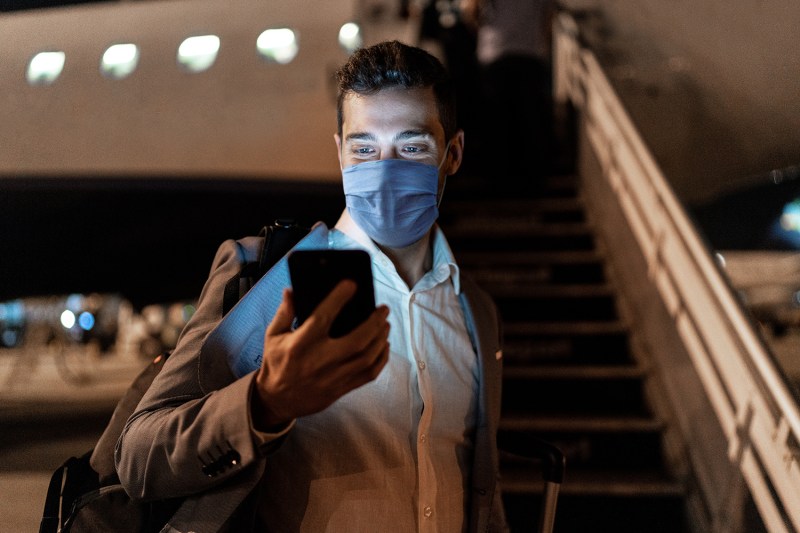
With the Pfizer, Moderna, and Johnson & Johnson vaccines now being administered around the U.S. and pictures of vaccine jabs and posing with vaccination cards spreading across social media, naturally, everyone’s thoughts are turning to when they can finally hop on a plane and take that much-needed vacation. But just because the vaccine rollout is underway doesn’t mean we can throw caution to the winds, as Dr. Fauci, the Centers for Disease Control and Prevent (CDC), and numerous health and public safety officials have said. There are the new COVID variants to consider, not enough people may take the vaccine to start ensuring herd immunity (which could require anywhere from 70-90% of the population being vaccinated to be fully effective), and states may reopen too quickly, sparking outbreaks. Plus, with international travel, you might be heading to a country that may not have as many citizens vaccinated or even have vaccines yet, leaving the potential for COVID to be brought in or out.
So what does that mean for your travel plans? There are still a lot of unknowns, but we’ve distilled all the information floating around out there down to some essential must-knows.
Related Guides
- Want To Travel In 2021 or 2022? Now’s The Time To Start Planning
- After COVID-19, Travel Bubbles Could Be the First Step for Travelers
- The Best Places to Book Travel and Vacation Rentals in 2021
You can still be infected or infect others
While all three vaccines are equally effective at preventing severe COVID cases that require hospitalization or lead to death, the CDC says that you could still be infected with COVID and have mild symptoms or be non-symptomatic. The vaccines may also prove less effective against the new COVID variants. Furthermore, it’s unknown if being vaccinated fully prevents individuals from spreading the disease.
So even if you’ve been vaccinated and have no symptoms, you could still be carrying COVID and could pass it unknowingly to people in a different country, or get COVID yourself.
You shouldn’t travel until several weeks after receiving the vaccine
If you must travel, wait until a few weeks after you get your second vaccine (or, in the case of the Johnson & Johnson vaccine, the first and only). You’re not immediately immune right after the jab; it takes several weeks for our immune systems to learn and develop their defenses against the virus. Experts say it could take about two weeks for the second dose of the vaccine to fully take effect.
Even with the vaccine, you should still take precautions
Just because you’re vaccinated doesn’t mean everyone around you is yet. Vaccine rollout varies widely by state and even more so by country. So even with the vaccine, you should still be wearing a mask (or even double-masking, if you feel like it), avoiding large indoor gatherings and crowded outdoor spaces, practicing social distancing, and being liberal with the handwashing and sanitizing.
What about those COVID-19 vaccine passports?

One of the biggest conversations going around right now with regards to the COVID-19 vaccine and travel is the creation of vaccine passports. Vaccine passports are digital, app-based, or paper “passports” that some countries have started issuing to their citizens to show border agents in other countries, airlines, and even tour operators that the traveler has been vaccinated against COVID-19. This would be required for entry into certain countries, and could also allow travelers to skip the otherwise mandatory quarantine period before and/or after travel. Iceland, for example, is among the first nations in the world to start giving vaccine passports to its citizens, proving they had been inoculated, along with other countries like China, EU members like Greece and Estonia, and Thailand. Airlines like Qantas, British Airways, and American Airlines are also developing their own versions.
While there are ethical and logistical concerns around vaccine passports, from the possibility of digital hacks to discrimination and inequality, vaccine passports are being viewed as a streamlined, safe way to permit international travel (or even domestic travel to Hawaii) and potentially bypass quarantine or not have to show a recent negative COVID test.
That being said, having been vaccinated and possessing a vaccine passport doesn’t give you carte blanche to travel extensively at leisure. As mentioned above, much is still unknown about how long inoculated individuals have immunity, or whether the virus can still be carried and passed to others. Many countries are also still keeping their borders closed as a precaution, so even with a vaccine passport, there are many countries around the world that still aren’t open to travelers. Some countries may still require that you quarantine or show negative COVID tests; the U.S., for example, still requires that you show a negative COVID test before boarding a flight from abroad to the U.S., and recommends self-quarantining for at least a week.
These vaccine passports programs are extremely new and there are still a lot of logistics for countries and businesses to figure out and properly implement and enforce. So you shouldn’t bank on them opening a lot of doors (or borders, in this case) for a while, although many experts are predicting they will be a huge part of the travel landscape for the foreseeable future.
Even if you do want to move forward with plans to visit a country that will accept a COVID-19 vaccine passport, you should follow all CDC health and safety guidelines, like wearing a mask and staying six feet apart from others.
So, now what?
With all these considerations, still the best answer to “Can I travel now?” is “For the health and safety of yourself and others, you probably shouldn’t.” The CDC’s official word on the subject is, even if you’re fully vaccinated, that “you should still delay domestic and international travel.” With President Biden predicting enough vaccine doses for all U.S. adults by May, come summer or fall, it’s likely we’ll have a better view of how well the global vaccine rollout is going and that can help inform your travel plans. Even though we may see the light at the end of the tunnel, we all still need to be cautious and play it safe for the time being. Our big, blow-out, post-pandemic adventure can wait a bit longer (which you can plan and book in the meantime).
Until then, though, the CDC recently announced that small groups of vaccinated individuals can spend time together indoors without masks. So for now, it’s best to stick to local or regional travel and plan a safe, much-needed small reunion with immediate family or close friends.



